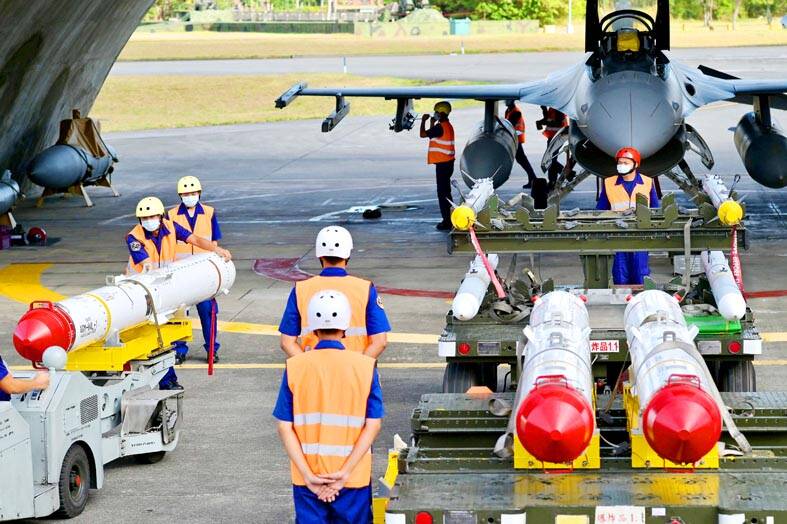Taiwan is to buy as many as 400 land-launched Harpoon missiles intended to repel a potential Chinese invasion, completing a deal that the US Congress approved in 2020, a trade group’s leader and people familiar with the matter said.
Taiwan has previously purchased ship-launched versions of the Harpoon, which is made by Boeing Co.
Now, a contract with Boeing issued on Taiwan’s behalf by the US Naval Air Systems Command marks a first for the mobile, land-launched version, US-Taiwan Business Council president Rupert Hammond-Chambers said.

Photo: Sam Yeh, AFP
Three other people familiar with the deal, including an industry official, confirmed the contract is for Taiwan.
The Pentagon announced the US$1.7 billion contract with Boeing on April 7, but made no mention of Taiwan as the purchaser. The deal comes as US-China tensions are high, particularly over Taiwan. China held military drills around Taiwan after President Tsai Ing-wen (蔡英文) met with US House of Representatives Speaker Kevin McCarthy in California earlier this month.
US Army Lieutenant Colonel Martin Meiners, a Pentagon spokesman, declined to say whether Taiwan would be the recipient of the Harpoon missiles, but said: “We will continue to work with industry to provide Taiwan defense equipment in a timely manner.”
“The United States’ provision to Taiwan of defense articles, which includes sustainment to existing capabilities via Foreign Military Sales and Direct Commercial Sales, is essential for Taiwan’s security,” Meiners said.
Ministry of National Defense spokesman Major General Sun Li-fang (孫立方) told a briefing in Taipei yesterday that he would not comment on the details of the sale, but Taiwan is confident it can be completed on schedule.
Criticizing the deal, Chinese Ministry of Foreign Affairs spokesman Wang Wenbin (汪文斌) said that it would “undermine China’s sovereignty and security interests.”
The US should “stop seeking to change the ‘status quo’” in the Taiwan Strait, he said.
The Harpoon contract has been cited by US lawmakers, including US Representative Michael McCaul, chairman of the House Committee on Foreign Affairs, as part of as much as US$19 billion in “backlogged” US sales to Taiwan that they say need to be accelerated.
In addition to the Harpoon, the list includes the F-16 Block 70 fighter, the MK-48 torpedo, the M109A6 Paladin self-propelled howitzer and the Stinger missile.
The US$1.7 billion weapons contract was preceded in March last year by a US$498 million contract to Boeing specifically for Taiwan that ordered Harpoon “Coastal Defense System” launch equipment such as mobile transporters, radar and training equipment.
In other news, Sun, in response to China holding military exercises in the Yellow Sea yesterday, said the drill was short, taking place from 9am to noon, and that the area it covered was small.
The nation’s armed forces had closely monitored the surrounding waters and airspace, he added.
Additional reporting by CNA

A Ministry of Foreign Affairs official yesterday said that a delegation that visited China for an APEC meeting did not receive any kind of treatment that downgraded Taiwan’s sovereignty. Department of International Organizations Director-General Jonathan Sun (孫儉元) said that he and a group of ministry officials visited Shenzhen, China, to attend the APEC Informal Senior Officials’ Meeting last month. The trip went “smoothly and safely” for all Taiwanese delegates, as the Chinese side arranged the trip in accordance with long-standing practices, Sun said at the ministry’s weekly briefing. The Taiwanese group did not encounter any political suppression, he said. Sun made the remarks when

The Taiwanese passport ranked 33rd in a global listing of passports by convenience this month, rising three places from last month’s ranking, but matching its position in January last year. The Henley Passport Index, an international ranking of passports by the number of designations its holder can travel to without a visa, showed that the Taiwan passport enables holders to travel to 139 countries and territories without a visa. Singapore’s passport was ranked the most powerful with visa-free access to 192 destinations out of 227, according to the index published on Tuesday by UK-based migration investment consultancy firm Henley and Partners. Japan’s and

BROAD AGREEMENT: The two are nearing a trade deal to reduce Taiwan’s tariff to 15% and a commitment for TSMC to build five more fabs, a ‘New York Times’ report said Taiwan and the US have reached a broad consensus on a trade deal, the Executive Yuan’s Office of Trade Negotiations said yesterday, after a report said that Washington is set to reduce Taiwan’s tariff rate to 15 percent. The New York Times on Monday reported that the two nations are nearing a trade deal to reduce Taiwan’s tariff rate to 15 percent and commit Taiwan Semiconductor Manufacturing Co (TSMC, 台積電) to building at least five more facilities in the US. “The agreement, which has been under negotiation for months, is being legally scrubbed and could be announced this month,” the paper said,

Japan and the Philippines yesterday signed a defense pact that would allow the tax-free provision of ammunition, fuel, food and other necessities when their forces stage joint training to boost deterrence against China’s growing aggression in the region and to bolster their preparation for natural disasters. Japan has faced increasing political, trade and security tensions with China, which was angered by Japanese Prime Minister Sanae Takaichi’s remark that a Chinese attack on Taiwan would be a survival-threatening situation for Japan, triggering a military response. Japan and the Philippines have also had separate territorial conflicts with Beijing in the East and South China